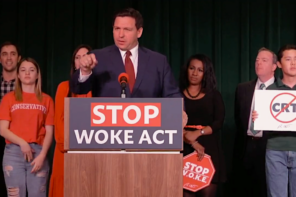How to explain Trump’s success in the context of American Christianity?
Rachel Held Evans has offered: “Racism and xenophobia remain powerful forces in our country, as does celebrity worship, and white Christians aren’t as immune from these influences as they like to think.”
On the other hand, Alastair Roberts at Mere Orthodoxy argues that Trump’s popularity might be driven by Christian progressives’ “unfair marginalization, rejection, and pathologization of valid concerns” white evangelicals have.
Meanwhile, the forces progressive Christians condemn—racism, xenophobia, misogyny—have not only animated Trump’s campaign since its inception, but inspired acts of real, physical violence against other marginalized communities.
So what’s going on?
It has been widely reported that a certain level of pathology is at work among white, working- and middle-class Americans. There is a spiking mortality rate in this population, attributed not to the usual culprits like heart disease or diabetes, but to “an epidemic of suicides and afflictions stemming from substance abuse: alcoholic liver disease and overdoses of heroin and prescription opioids.”
I would like to suggest that it is no coincidence that Trump’s rise and an uptick in drug or alcohol abuse-related deaths are happening concurrently.
The states where mortality increased most heavily—West Virginia, Mississippi, Oklahoma, Tennessee, Kentucky, Alabama, and Arkansas—are precisely the same states where Trump achieves the strongest support.
Some of us feel a moral impulse to condemn the ugly sentiments at work in the Trump camp. But we have to keep the broader structural realities in mind—deindustrialization, an unequal economy recovery, the dissolution of the middle class.
A look at Trump’s most recent wins at the New Hampshire and South Carolina primaries as well as the Nevada caucus show that the reductive dismissiveness of progressive Christians is turning dangerous. A deeper, more graceful introspection to the root causes of Trump’s ascendance could go far in combating the very forces that have made him a viable presidential candidate.
Considering the stakes, we can’t afford not to do so.





